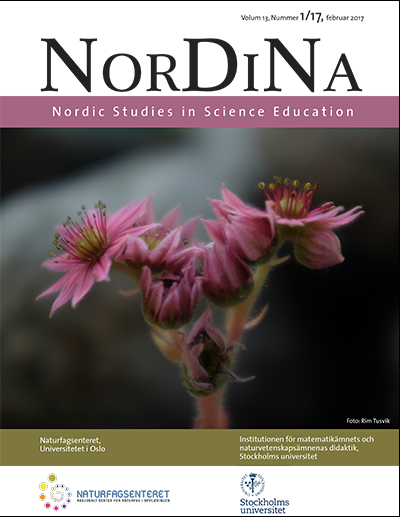Verkliga vardagssammanhang i årskurs 4 eller kontextlös kunskap i årskurs 8? Everyday life context in grade 4 or knowledge without context in grade 8
DOI:
https://doi.org/10.5617/nordina.2878Keywords:
comparative studies, interest in Science, TIMSSAbstract
AbstractInternational comparisons of students’ knowledge as TIMSS and PISA have shown that Swedish students' knowledge of science deteriorated during the 2000s, compared to both previous years and to other countries. In grade 4, however, the results improved between 2007 and 2011 and Sweden is one of the countries showing the greatest difference between the results in grade 4 and grade 8, suggesting a weak knowledge development in science between these grades.
This study compares Swedish pupils' results for individual tasks in Science in TIMSS 2011 with an average score of countries in the EU or OECD. The items are classified by whether they are put in a context and if they ask for school specific knowledge or if they could be solved with knowledge from sources outside school. A large proportion of the items in grade 4 is linked to a context and to students' everyday lives, which explains the good results for the younger students. Few items in grade 8 are of interest for the students or linked to students' daily lives and on these items Swedish students often perform below average for the EU / OECD, which contributes to the less favorable outcome in grade 8. The weak development of knowledge between grades 4 and 8 that is indicated by TIMSS suggests that the formalized science classes in school do not reach the students and it points to the need for a clearer connection to students' interests and experiences.
Downloads
Additional Files
Published
Issue
Section
License
Authors who publish with this journal agree to the following terms:- Authors retain copyright and grant the journal right of first publication with the work simultaneously licensed under a Creative Commons Attribution License that allows others to share the work with an acknowledgement of the work's authorship and initial publication in this journal.
- Authors are able to enter into separate, additional contractual arrangements for the non-exclusive distribution of the journal's published version of the work (e.g., post it to an institutional repository or publish it in a book), with an acknowledgement of its initial publication in this journal.
- Authors are permitted and encouraged to post their work online (e.g., in institutional repositories or on their website) prior to and during the submission process, as it can lead to productive exchanges, as well as earlier and greater citation of published work (See The Effect of Open Access).


